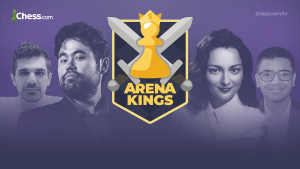
Genius Kids
Before I get into today's column, I'd like once again to thank Grandmaster Bhat for his excellent contributions to this site for over a year. His articles have been uniformly excellent, and he took the time to come up with thought-provoking questions to improve the readers' abilities, and put every game in multiple times, so that we could conveniently think about those questions without accidentally seeing the answers; a level of excellence, which I will not work hard enough to emulate in today's article.
At the same time as we can appreciate everything he brought to chess.com, we can also be happy to hear that his replacement will be WGM Pogonina, who should not need an introduction on this site at this point. The column was in excellent hands when she covered for GM Bhat during one of his recent tournament binges, and I think we can look forward to a lot more education and entertainment from her.
And now, for today's paltry morsel from myself.
Genius Kids

It happens younger and younger these days, and no tournament player can avoid it. They used to talk of clashes of generations. Top players facing the challenge of a new generation, with new chess ideas as well as fire in their bellies. But with an acceleration in the growth of young, talented chess players, the turnover is too quick to speak of "generations." Really, you can only be up-and-coming for a year or two tops. Soon enough, you are recognized as being strong, and are contending with challenges from younger players.
Magnus Carlsen pushed his way to the top of the chess world in 2009. But before he even had half a chance to try to wrest the title of "best chess player" from the Anand-Kramnik-Topalov triumvirate, he already had to defend himself against other surging rivals like Hikaru Nakamura. Carlsen's rise has been so meteoric, that Nakamura is a comparative "late-bloomer." But Fabiano Caruana, who almost denied him the title in the last round at Corus in January is younger than him. And in 2010 or 2011 at the latest, I think we will see Carlsen forced to play plenty of serious games against players younger than himself.
So, even as improving players carry their ambitions to tournaments, they must also be prepared to defend what they have achieved so far against newer players thirsty for their... defeat. A couple years ago, I held the Samford Fellowship, and travelled around to tournaments, pursuing greater glory. Tournament victories, brilliant games, GM norms, rating points. Although nowadays many prodigies are established by the age of 12, I in many ways imagined myself a "young" player, having started late and taken time out for college. In any case, I was looking "up."
But so were those younger than I. And in a flash, they had caught up to me, and I had to defend myself against the fierce onslaught of the Genius Kids. One memory is of reading the news of Sergey Karjakin becoming a Grandmaster at age 12, and realizing there was a 12 year old who could best me in a match. Another big moment came in a tournament in Moscow when an 11 or 12 year old Ukrainian boy beat me badly. At the time it was quite painful.
At the recent Far West Open in Reno, there were a plethora of terrific young American talents participating in the top section. Already in round 1, half of the players in the "stage" area were high school age or younger. En route to winning the event (so you can extrapolate, he was being paired with the top players in the swiss system event), my friend GM Jesse Kraai played 4 youngsters in 6 rounds (average age about 13). As I arrived in the hall for round 5, he informed me that I was paired with "Genius Kid." "Which one?" I asked, referencing the fact that there were plenty of them about. "Your Genius Kid," he replied, referencing that I had spoken very well to him of a certain David Adelberg.

A lot of chess players are looking for good results, and would rather not face an improving 12 year-old master like David. Having to a large extent given up on such dreams, I was instead thrilled to play him. I had been hoping to get paired with him or Kayden Troff for example. I feel that at this point, one of the best things I can do in chess is provide kids of their level with another interesting opponent to test their chess.
Last year, I played David twice. I think he was in the 2100s. Our first game was at the exact same tournament, the Far West Open. It's round 2 in this blog: http://blog.chess.com/dpruess/reno-rd-1 if you want to see it. After that game I thought to myself "that's the last time you'll ever beat this kid." 2 months later, we played to a tough draw at the Copper State International (http://americanchess.net/events/complete-schedule/copper-state-international/). At that time I chose an opening that played to what I thought his strengths were to make the game most interesting (I often do this, and it has nothing to do with arrogance). By now he had acquired the National Master title, I'd watched his excellent play in several events including the US Chess League where he was a key part of the Arizona Scorpions, and I figured he'd gotten so good that to make a good game of it, I should play towards his weaknesses. But even with an aggressive 1.e4 opening, I was defeated convincingly.
Here is the game; play through it once first without comments, and see if you can figure out where white went wrong.
Here is my take on what happened. David surprised me a little by playing b5. Often black chooses to castle queenside when they have this gf pawn structure in the Sicilian, and b5 makes that far less appealing, so it seems a bit strange to give white that info so soon. However, I probably made a big mistake in response with Bh5, a move aimed against queenside castling. If b5 made it less likely that black would castle queenside, why hurry to make it even harder for him. Instead I should simply have castled, and adapted my development based on black's next move, probably trying to bring the a1 rook to d1 before committing the e2 bishop. How David responded to Bh5 is very instructive. Typically, the bishop would be required for the defense of the pawn on d6 against which white can make some pressure on the d-file. Therefore, it is either placed on e7 or f8, making it unlikely that black would castle kingside. However, David astutely recognized that the bishop on h5 would be horribly misplaced if he castled kingside, getting in the way of a possible kingside attack, and not helping to control any vital points (since f7 would be amply defended). Therefore he trusted in the importance of his counterplay in case of white piling up on the d6-pawn and rushed to castle. Another extremely important link in this plan is to play f5 at some point, releasing a potential monster on g7. Hopefully that explains the main strategic strand of this game. Here it is again with some further notes:
After this, David was visibly thrilled. I was happy for him too, because he's a great guy. But despite that, and despite my prediction, I'm still going to try to beat him again one day.
To return to my theme: this past weekend, I attended the Northern California State Scholastic Championships. Most of the top-rated kids did not attend. Though they are themselves only 12 or 14 or 16 years old, they have already established themselves as serious masters, and could legitimately fear that some fresh, dangerous 1900 would be there to unseat them. In a sense, the nine-year old who was seeded first in the high school section (!!) was already an established player by virtue of his tournament successes in the past year; and for whom up-and-coming rivals were gunning. He ceded a few draws and had to be content with third place.
And before publishing this column, I checked on the results of last week's National Junior High Championships. David Adelberg had tied for first place (taking the title on tiebreaks). David is now a strong master, the youngest ever in Arizona, with a national title. While he may be aiming for IMs like myself at tournaments, it is also time that he starts preparing for the ten-year-olds who will soon be coming to get him! And that ten-year old may need to watch his own back: Nikolai may be coming for him in a matter of months. And on and on it goes...






